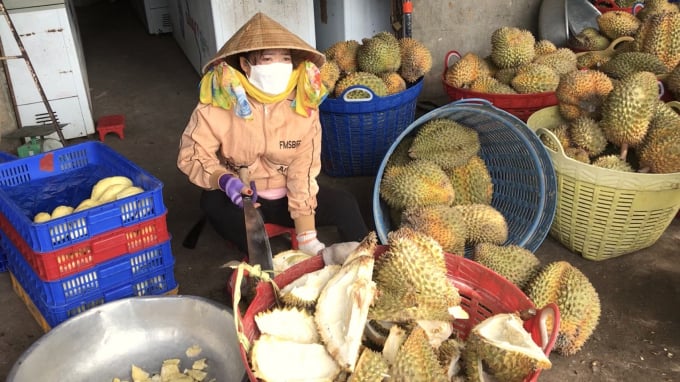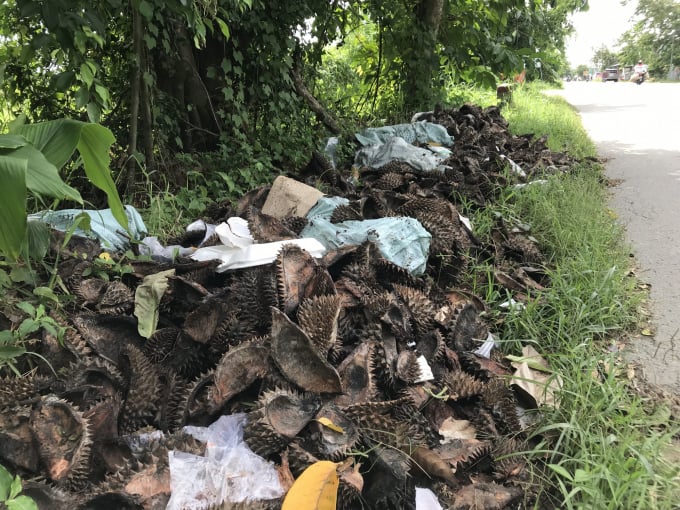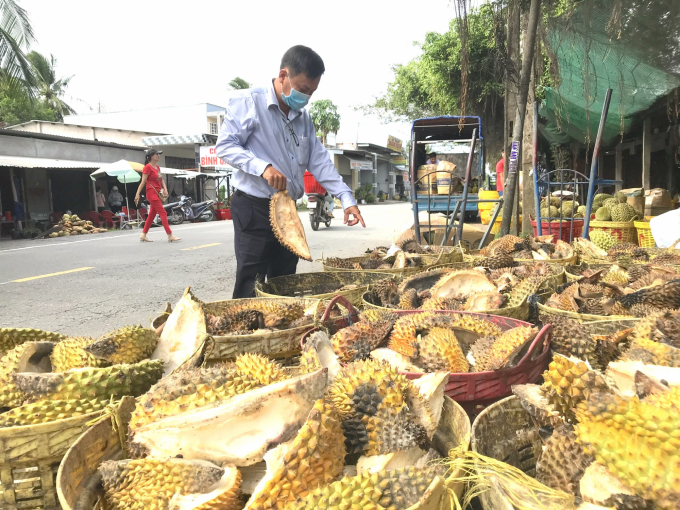November 26, 2025 | 06:21 GMT +7
November 26, 2025 | 06:21 GMT +7
Hotline: 0913.378.918
November 26, 2025 | 06:21 GMT +7
Hotline: 0913.378.918
Along Provincial Highway No. 868 that runs through Cai Lay district, Tien Giang province, it’s easy to bump into dozens of baskets of durian husks which are ordinarily discarded in the area. So far, there have been no effective way of handling this type of by-product.
For the farm owners who have large-scale orchards and vacant land, they can dump durian husks right on the spot. However, for those who have no vacant land, they have to hire trucks to transport and dump the organic waste in other places. This is not only costly but also causes environmental pollution. “Durian husks are usually discarded as garbage. We have to pay VND20,000 per truck,” a durian orchard owner complained.

Durian husks are ordinarily discarded. Photo: Minh Dam.
For oversized or ugly durians, the flesh will be removed from the husks then frozen for exports. When the durian-growing area of Cai Lay enters the peak of durian harvest season, typically tens of tons of durian husks are discarded everyday.
According to Nguyen Thi Diep, a durian orchard owner in Long Trung commune, Cai Lay district, as her facility could separate the flesh of 2-3 tons of durians per day, the volume of durian husks could reach over one ton everyday.
“I have no choice but to hire trucks to transport and dump the durian husks right in my orchard,” Diep said.
Talking about the solutions to handle durian leftovers, Chairman of the People’s Committee of Tam Binh commune Nguyen Van Sang said: “In the past, there was a unit that came here to collect and turn durian peels into organic fertilizer. However, it has stopped working now. In the face of the situation, the local authorities mobilized orchard owners, durian businesses to hire trucks to collect and transport durian husk waste to the landfills in the province. Dumping durian husks on vacant land of the orchards is not recommended because this can cause environmental pollution and can affect the development of durian trees.

Durian husks are not utilized or dumped in the right places. Photo: Minh Dam.
“We mobilized orchard owners and business households to sign a contract with Viet Toan Company to treat durian husks. In 2021, some organic fertilizer manufacturers collected all the durian husks discarded in the area. We will continue to encourage them to maintain their operations to ensure a healthy environment in the coming time,” Sang said.
According to Deputy Head of Agronomy Department (Southern horticultural research institute) Dr.Nguyen Thi Ngoc Truc, like other agricultural by-products such as dragon fruit stalks, water hyacinth, durian husks must be composted to become organic fertilizer and return nutrients to the soil. If these agricultural by-products are discarded as the rubbish they will harm environment and transmit pathogens. In Vietnam, not only durian husks but also many other agricultural by-products are considered wastes. People don’t know how to convert these wastes into organic fertilizer while they are a source of nutrients for the soil.
For that reason, Dr. Truc shared the process of composting durian husks with probiotics with durian growers. First, chopping durian husks into small pieces, as small as possible because the smaller they are the faster decomposition takes place. Then, mixing chopped durian husks with lime powder and covering with plastic tarpaulin to avoid rain water.

Durian husks come out as a previous organic source. Photo: Minh Dam.
In the next two weeks, once a week using 30 liters of probiotics (Trichoderma or Bacillus subtilis) to mix with one ton of durian husks to decompose the organic waste into Cellulose. Finally, adding nitrogen-fixing bacteria by dissolving Burkholderia Tropica, using 30 liters for one ton of Cellulose for a duration of one week. After 4 weeks, one ton of compost will be made out of one ton of durian husks.
To have 30 liters of probiotics to turn durian husks into organic fertilizer at low cost, only one kilo of Trichoderma or Bacillus subtilis which are available on the market is needed. The recipe to produce 100 liters of probiotics is mixing 100 liters of water with 3% of sugar and composting for five days.
Durian is a valuable fruit in the Mekong Delta in general as well as in Tien Giang province in particular. Currently, the region has more than 25,000 hectares under durian cultivation. Along with improving the yield and the quality of durians, treating durian peels to benefit growers and environment should be paid attention to make the durian industry sustainable and environmentally friendly.
Translated by Mai Tham
/2025/11/25/0045-1-135246_13.jpg)
(VAN) Ca Mau is researching a model of sea-encroaching embankments combined with viaducts and logistics service zones, aiming both to prevent erosion and create land funds for marine economic development.

(VAN) The information was shared at the seminar 'Urban Agriculture - Solutions for Developing Green Spaces,' organized by the Kinh te & Do thi Newspaper and the Biotechnology Center of Ho Chi Minh City.
/2025/11/19/4141-2-132831_216.jpg)
(VAN) One of Japfa's outstanding solutions is implementing digital transformation and artificial intelligence (AI) to optimize operations, enhance productivity, and advance sustainable development.
/2025/11/19/4847-1-093540_448.jpg)
(VAN) The Gia Lai Provincial People’s Committee had a working session with the delegation of the U.S. Department of Agriculture, the State of Idaho, and representatives of the State's leading enterprises.

(VAN) Ca Mau has a sufficient foundation to become a strong regional aquaculture center, where production integrates the economy, the environment, and the lives of the people.

(VAN) SEIKI Group envisions itself as a pioneer in the ‘dual transformation’ of digital technology and green industry, standing alongside the Government and Vietnamese businesses in their pursuit of sustainable development.

(VAN) The VNGEONET network affirms Viet Nam's progress in mastering digital space, providing a precise positioning data platform to serve socioeconomic development.